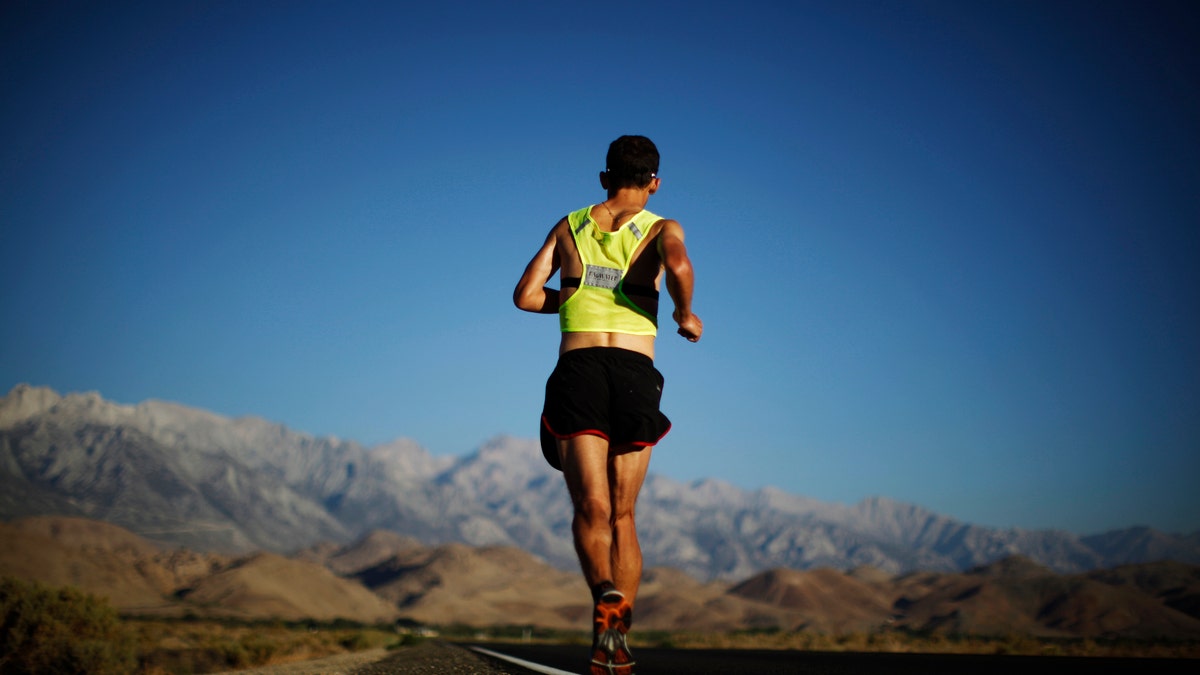
(REUTERS/Lucy Nicholson)
Ultramarathons – races over 26.2 miles – have experienced an exponential surge in popularity over the past decade, as runners line up to push their bodies to the limit during races that sometimes boast 100-mile-long courses.
Now, a new study published in the journal PLOS ONE seeks to explore the health of ultramarathoners – and whether the extreme sport carries any dangerous consequences.
Lead study author Dr. Marty Hoffman is familiar with the trials – and joys – of ultramarathoning. After logging his first 50-mile race in 1985, Hoffman has gone on to complete numerous ultras over the years, including 10 100-mile races.
“The real key here is figuring out whether there’s an upper limit for the valuable effects from exercise…,” Hoffman, a professor of physical medicine and rehabilitation at the University of California, Davis, told FoxNews.com. “We know that moderate exercise has considerable health benefits, so then the question is, what happens if you go beyond that?”
Ultramarathoners: The picture of good health?
For his study, Hoffman and Dr. Eswar Krishnan, an assistant professor of medicine at the Stanford University School of Medicine, recruited 1,200 ultrarunners to participate in an online questionnaire about their running history, training habits, general health and any running injuries incurred over the previous 12 months.
At a glance, ultramarathoners appear generally healthy, reporting few serious health problems and illnesses throughout the year-long study. They missed fewer days of work due to illness or injury compared to the general population and also reported visiting the doctor less frequently.
“These people generally are healthy,” Krishnan told FoxNews.com. “If you already have heart failure or other medical issues, you wouldn’t be ultramarathon-running.”
However, the study authors acknowledged that the mental toughness of ultramarathoners – honed through years of extreme training – might also make them less likely to admit to illness.
“It may have to do with mentality, endurance. People who like to take a day off at the slightest sign of a medical issue versus people who can put up with a lot of stuff, that needs to be factored in,” Krishnan said. “A lot of it is in their mind, it’s in their brain, it has to do with endurance.”
Knee pain, stress fractures and asthma
Though generally healthy, ultrarunners are by no means immune to illness or injury, Krishnan and Hoffman said. The majority of the health problems encountered by ultramarathoners fell into three categories: knee pain, stress fractures and problems relating to allergies and asthma.
“Knee pain is a major concern…ligament problems, tendon problems,” Krishnan said. “We hope to see over time how many are serious and how many are soft tissue injuries.”
Notably, ultrarunners also had high rates of asthma and allergies. Though only 7 to 8 percent of the general population has problems with asthma or allergies, 11 percent of survey participants reported these types of issues.
“People who run, presumably, they spend a lot of time outdoors and they encounter a lot of allergy-producing, asthma-provoking allergens,” Krishnan said. “But obviously it’s not activity-limiting though, or they wouldn’t be running marathons.”
However, the true health consequences of ultramarathoning remain to be seen – and Krishnan and Hoffman plan to continue to follow this group of ultrarunners for the next 20 years.
“Let’s say when we review it, it turns out that 600 (out of the 1,200) stopped running because of a major medical issue – that would be a dead giveaway that it’s not necessarily safe for everybody,” Krishnan said.
In the future, they also hope to assess whether or not ultrarunners are more prone to developing serious, activity-limiting injuries or serious health issues related to over-exercising.
“In particular, in recent years there’s been concern about high volumes and intensity of exercise causing cardiac fibrosis,” Hoffman said. “There’s also some concern about the effect of exercise on the immune system and if that alters risk for certain types of cancer.”
Additionally, they hope to delve into the psyche of these extreme athletes – to find out what makes them tick, and what drives them to push their bodies to extremes.
